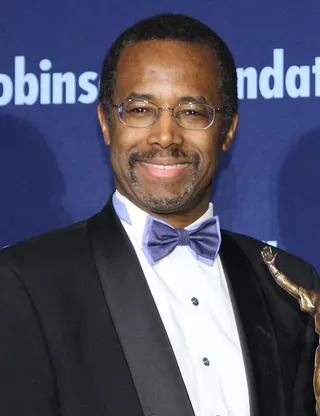Black History Month: African-American Health Pioneers
A list of African-American health heroes.

1 / 15
Paying Homage - In honor of Black History Month, BET.com celebrates those who have made major steps in moving the health of our nation forward. From public officials to doctors, this list embodies some of the greatest African-American minds that have impacted health policy, research and medical procedures. —Kellee Terrell (Photo: GettyImages)

2 / 15
Michelle Obama (1964-present) - While known for her impeccable sense of fashion and strength, FLOTUS Michelle Obama is a serious health advocate, especially when it comes to childhood obesity. In 2010, she created Let’s Move!, a popular program aimed at reducing obesity rates among children in the U.S. Her work has even helped bring healthier lunches to schools across the country. (Photo: AP Photo/Cliff Owen, File)

3 / 15
Dr. Rebecca Lee Crumpler (1831-1895) - Dr. Crumpler was the first African-American woman to earn a medical degree in 1864. She devoted her life to improving health in the Black community through research and working in clinics. When the Civil War ended, she dedicated her career to helping newly freed Blacks in the South by providing them medical care. (Photo: Public Domain)

4 / 15
Phill Wilson (1956-present) - HIV-positive activist Phill Wilson believed that Black America needed a stronger response to the AIDS epidemic in our community. So in 1999, Wilson founded the Black AIDS Institute, a think tank that over the years has conducted trainings, publishes its own studies and articles and mobilizes other AIDS service organizations around the U.S. (Photo: Robert MacPherson/AFP/GettyImages)

5 / 15
Dr. Regina Benjamin (1956-present) - A trailblazer, this former U.S. surgeon general was appointed in 2009 by President Obama. Dr. Benjamin was the force behind the first National Prevention Strategy, believing that social determinants played a major role in our health outcome. She also spoke out about the need for Black women to care more about health than their hair. (Photo: Robert Giroux/Getty Images)
ADVERTISEMENT

6 / 15
Dr. Lonnie Robert Bristow (1930-present) - This Harlem native is mostly known for being the first African-American president of the American Medical Association (AMA) in 1995 and was also the first African-American president of the American Society of Internal Medicine too. During his career he focused on the need for diversity among hospital staffs, affordable health care for all and treating patients with dignity and respect. (Photo: Courtesy of the National Association of Advisors for the Health Professions, Inc.)

7 / 15
Dr. Dorothy Lavinia Brown (1919–2004) - Dr. Dorothy Lavinia Brown was the first African-American woman surgeon in the South. Despite being raised in an orphanage, Brown excelled also becoming the chief of surgery at Nashville's Riverside Hospital and the first Black woman fellow of the American College of Surgeons. Brown also was in politics, being the first Black woman to serve in the Tennessee legislature. (Photo: Courtesy of the U.S. Department of the Interior)

8 / 15
President Barack Obama (1961-present) - While President Obama made history for becoming the first Black president of the United States, he also made history with the passing of the Affordable Care Act. This legislation will make it possible for more than 30 million Americans to have health insurance. (Photo: Kristoffer Tripplaar-Pool/Getty Images)

9 / 15
Ben Carson (1951-present) - Ben Carson, graduate of University of Michigan Medical School, made history when he became the first surgeon to successfully separate Siamese twins who were connected from the back of the head. In 2008, this pediatric neurosurgeon was awarded the Presidential Medal of Freedom, the nation's highest honor for civilians.(Photo: Bryan Bedder/Getty Images for The Jackie Robinson Foundation)
Photo By Bryan Bedder/Getty Images for The Jackie Robinson Foundation

10 / 15
Jocelyn Elders (1933-present) - In 1993, under President Clinton, Dr. Elders became the first African-American to serve as surgeon general. She was revolutionary, advocating for drug legalization, a pro-choice nation and passing out contraceptives in schools. Unfortunately, she was fired in 1994 for comments encouraging that masturbation be taught in schools in order to address the HIV epidemic. (Photo: Mike Theiler / Reuters)
ADVERTISEMENT

11 / 15
Otis Boykin (1920-1982) - Boykin, a Texas-native, invented 28 electronic devices, including his most famous, an improved electrical resistor used in pace makers. Boykin died of heart failure in the early ‘80s. (Photo: US Department of Energy)

12 / 15
Mary Eliza Mahoney (1845-1926) - Mahoney was the first Black woman to become a registered nurse in the U.S. In 1905, she graduated from New England Hospital for Women and Children, becoming a well respected private nurse with clients throughout the country. She also became a member of the American Nurses Association, which was not very welcoming to Blacks at the time. (Photo: Wikicommons)

13 / 15
William Augustus Hinton (1883-1959) - Hinton was the son of former slaves and was the first Black doctor to graduate from Harvard University. He also declined a full-ride scholarship for African-American students because he wanted to compete with other students regardless of race. Hinton became an expert in the treatment and diagnosis of syphilis. (Photo: Harvard University)

14 / 15
Mamie Phipps Clark (1917-1983) - Mamie Phipps Clark was one of the first African-American women to earn a Ph.D. in psychology from Columbia University. Clark studied self-esteem, Blackness and mental health. She is best known for the “Clark Doll Test,” which played a major role in the Brown vs. Board of Education case. (Photo: Columbia University)
